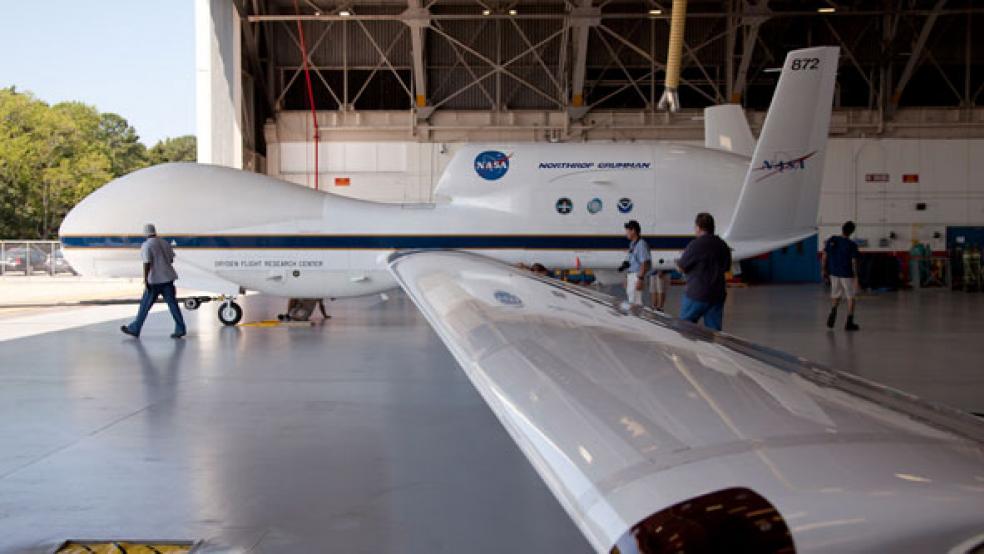On Wednesday morning, Defense Secretary Chuck Hagel sent shockwaves through the Pentagon when he announced that he would cut the number of top-level brass and civilian workers by 20 percent by 2019.
The staffing reduction would eliminate 3,000 to 5,000 jobs, most of them high paying ones, and eliminate about $3 billion a year from DOD’s budget. While it’s just a drop in the bucket in terms of total DOD jobs – there are 2.1 million active duty troops and DOD employees – it was widely seen as a symbolic move by Hagel to show he’s serious about cutting the Pentagon’s budget.
At the same time the Hagel story was making the rounds, the Center for Public Integrity released a report showing just how tough Hagel’s task will be. The center’s report dealt with the $223 million Global Hawk drone. The Air Force, the Army and the White House don’t want it because they don't need it.
What the Pentagon wants and what they get are often two different things. In this case, the decision was made by Northrup Grumman – the drone’s manufacturer -- and a few lawmakers who “do business” with Grumman. The pressure was so intense that the Pentagon caved and agreed to buy the machines that will probably never get off the ground.
THE BUSINESS OF WAR MACHINES
The tale of the Global Hawk is nearly identical to that of the M1 Abrams tank. As The Fiscal Times previously reported, lawmakers that represent districts where the tanks are made refuse to let the program die, despite the fact that the Army no longer needs or wants the tanks. This forced the Pentagon to spend $3 billion on a program that it simply doesn’t need.
Now, the Pentagon is being forced to spend an additional $2.5 billion for the Global Hawk. The DOD’s total budget of $759 billion will not be seriously affected by such a "modest" sum. But there are numerous programs, just like this one, that are obsolete but protected by special interests in Congress. Getting rid of just one of them is almost impossible and shows just how difficult it will be to make the sweeping reforms needed at the Pentagon.
"Killing a major program in production is rather like vampire-killing,” American University professor and defense budget effort Gordon Adams told the center. “You have to drive a silver stake through its heart to make sure it is dead.”
NOT OPERATIONALLY EFFECTIVE
The Global Hawk program began under President Bill Clinton at an original cost of $35 million per plane (it’s current $223 million price tag is an increase of 248 percent). It was meant to replace the manned U2 spy plane, which has a limited flight time due to pilot fatigue. The drone would be able to fly for more than a day.
But as the drone became more widely used, a key limitation was discovered: it could not fly through bed weather and had no systems to detect it. U2 pilots, on the other hand, could spot bad weather and fly around it. If the Pentagon wanted to gather intelligence over Russia in the middle of a blizzard it would have to use U2s, not drones.
This limitation led Pentagon testers to deem the drone "not operationally effective" in 2011. Canceling backorders for the drones would save DOD $2.5 billion (the total cost for the drone programs in 2011 and 2012 were $13.9 billion to $12.4 billion, respectively). DOD then determined that the U2 provided a better bang for the buck.
“The Block 30 Global Hawk has fundamentally priced itself out of our ability to afford it when the U-2 gives, in some cases, a better capability and, in some cases, just a slightly less capable platform,” Army Gen. Martin Dempsey told lawmakers in a Feb. 2012 defense budget briefing.
LOBBYING ARMY RISES
Fortunately for Northrop, they already had an army of 26 lobbyists on hand to block DOD’s request. Despite objections from the Pentagon and the White House, Congress demanded in the 2013-spending bill passed in December of last year that purchases of the drones continue. They even extended acquisition of new drones until 2016.
It came at a cost. Northrup’s political action committee dumped $500,000 into the reelection committees of members of the House Armed Services Committee. This includes $135,000 to Rep. Howard “Buck” McKeon (R-CA), and Rep. Jim Moran (D-VA), who recently wrote a letter to Hagel demanding Northrup be paid.
“Congress directed the Air Force to obligate previously authorized and appropriated funds to procure the remaining three Global Hawk Block aircraft," Moran and McKeon wrote in their May 13 letter. "Yet, as recently as May 9th … the Air Force has continued to ignore clear Congressional intent and has not obligated these funds."
"We encourage you to …ensure that the Air Force is in compliance with the current law," they added.
The drones are manufactured in McKeon’s district, with Northrup is headquartered in Moran’s.
The letter was effective. According to an Air Force spokesman, Northrup will be paid for the drones no one except Congress wants.





